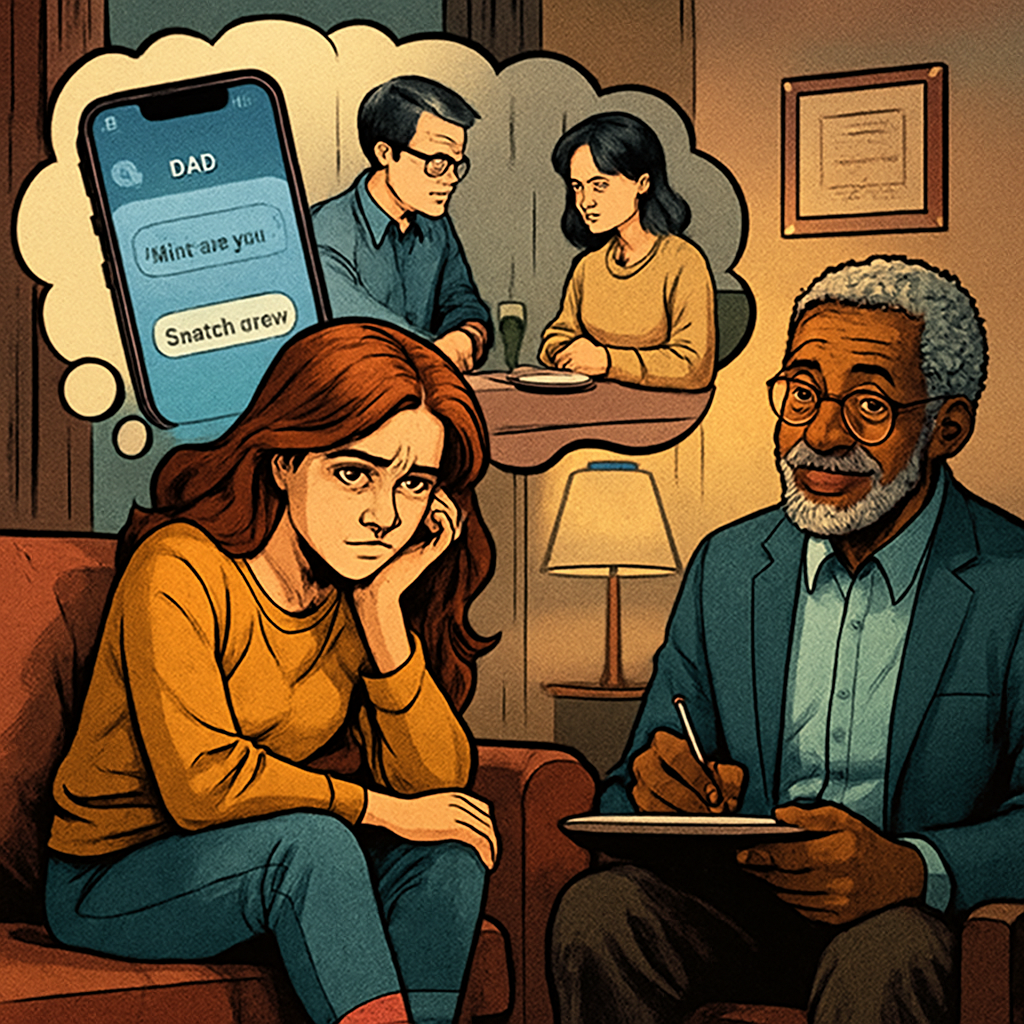Alexandra showed up to our first session in mismatched socks. Not the cute, intentional kind – proper disaster-level pairing: one ankle-length black, one knee-high with cartoon vegetables. She didn’t notice until forty minutes in when she crossed her legs. Instead of being embarrassed, she just shrugged and said, “This tracks for my life right now.”
I knew then we’d get along beautifully. What I didn’t know was that those mismatched socks were the perfect metaphor for her relationship with her father – two completely different communication styles trying desperately to function as a pair.
Her obsession with collecting vintage salt and pepper shakers shaped like fruit was endearing, though I suspect it stemmed from trying to create “pairs that made sense” in a household where emotional consistency was a foreign concept. She never mentioned this connection herself, but therapists notice these things.
The Bizarre Reality No One Is Talking About: Digital Dad Syndrome 🚩
Picture that moment when your phone pings with a novel-length text from a parent who, literally hours ago, couldn’t muster a “how was your day” over dinner. That’s exactly what Alexandra was dealing with.
Studies show that 68% of Gen Z report significant emotional whiplash from parents who communicate differently across channels. It’s giving ✨cognitive dissonance✨ on steroids.
The Emotional Bytes Breakdown 💭
What’s actually happening when Dad goes from IRL mute to text novelist? Let’s break down the emotional scripts at play:
In-Person Emotional Script: AVOIDANCE 💀
- Dad’s physical presence triggers his “vulnerability = weakness” emotional frame
- His body literally goes into mini-fight-or-flight when emotions enter the chat
- The script runs automatically: shut down, change subject, exit conversation
Text Message Emotional Script: CONNECTION ATTEMPT 🥲
- Without face-to-face triggers, emotional safety increases
- Dad can edit, perfect, and control the narrative
- His genuine need for connection finally gets expressed
- BUT the emotional byte lacks integration with his in-person self
Why The Mixed Messages Feel SO. DAMN. CRAZY. 🤌
- Your brain processes these as contradictory emotional inputs
- Creates what I call “parental version mismatch”
- The inconsistency activates your attachment system’s alarm bells
- Your need for predictability is being violated
- No cap, it’s basically emotional catfishing from your own parent
The Granular Truth of the Matter 💡
Reminder: When someone’s communication style changes drastically between channels, it’s not YOU being perceived differently – it’s THEM accessing different parts of themselves.
What Alexandra eventually realized was earth-shattering: her father wasn’t being fake in his texts OR in person. Both versions were real parts of him that couldn’t integrate because of his own emotional fragmentation. His emotional bytes for vulnerability and love existed, but they were locked in a digital-only frame that couldn’t transfer to face-to-face interaction.
The whole situation was giving major “I put the milk in before the cereal” energy – a fundamentally backward process that could technically work but feels deeply unsettling to witness.
Red Flags This Pattern Creates 🚨
- Constantly second-guessing what’s “real” 🚩
- Developing your own split communication styles 🚩
- Becoming the emotional translator for your parent 🚩
- Feeling like your existence is conditional based on the channel 🚩
- Developing main character syndrome as a coping mechanism 🚩
The truth is, parents with this digital/IRL split aren’t playing 4D chess with your emotions – they’re showing you the broken emotional frame they’re trapped in. It’s a trauma response that’s living rent-free in their emotional operating system.
What fascinated me most about Alexandra wasn’t just how she navigated this weird text-only-emotions situation, but her secret ability to perfectly mimic her father’s texting style when she wanted something. She could adopt his exact tone, paragraph structure, and even his weird overuse of ellipses…
I never told her how manipulative this was (and low-key impressive), because honestly? In the emotional Hunger Games of that household, adaptation was survival.
– Melanie Doss
Core Insight 💎
Remember: If their keyboard gets more emotional honesty than their actual child, it’s not a communication preference – it’s emotional constipation with a digital laxative.
References and Further Reading 📚
https://pmc.ncbi.nlm.nih.gov/articles/PMC5342251/
https://pmc.ncbi.nlm.nih.gov/articles/PMC2690709/
https://www.newportinstitute.com/resources/family-connection/communicate-grown-child/
https://pmc.ncbi.nlm.nih.gov/articles/PMC2805116/
https://pmc.ncbi.nlm.nih.gov/articles/PMC6327660/
https://www.newportinstitute.com/resources/family-connection/parent-involvement/
https://www.tandfonline.com/doi/full/10.1080/13229400.2024.2335493

